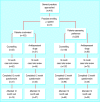Antidepressant drugs and generic counselling for treatment of major depression in primary care: randomised trial with patient preference arms
- PMID: 11282864
- PMCID: PMC30555
- DOI: 10.1136/bmj.322.7289.772
Antidepressant drugs and generic counselling for treatment of major depression in primary care: randomised trial with patient preference arms
Abstract
Objectives: To compare the efficacy of antidepressant drugs and generic counselling for treating mild to moderate depression in general practice. To determine whether the outcomes were similar for patients with randomly allocated treatment and those expressing a treatment preference.
Design: Randomised controlled trial, with patient preference arms. Follow up at 8 weeks and 12 months and abstraction of GP case notes.
Setting: 31 general practices in Trent region.
Participants: Patients aged 18-70 who met research diagnostic criteria for major depression; 103 patients were randomised and 220 patients were recruited to the preference arms.
Main outcome measures: Difference in mean Beck depression inventory score; time to remission; global outcome assessed by a psychiatrist using all data sources; and research diagnostic criteria.
Results: At 12 months there was no difference between the mean Beck scores in the randomised arms. Combining the randomised and patient preference groups, the difference in Beck scores was 0.4 (95% confidence interval -2.7 to 3.5). Patients choosing counselling did better than those randomised to it (mean difference in Beck score 4.6, 0.0 to 9.2). There was no difference in the psychiatrist's overall assessment of outcome between any of the groups. 221/265 (83%) of participants with a known outcome had a remission. Median time to remission was shorter in the group randomised to antidepressants than the other three groups (2 months v 3 months). 33/221 (15%) patients had a relapse.
Conclusions: Generic counselling seems to be as effective as antidepressant treatment for mild to moderate depressive illness, although patients receiving antidepressants may recover more quickly. General practitioners should allow patients to have their preferred treatment.
Figures
Comment in
-
Managing depression in primary care.BMJ. 2001 Mar 31;322(7289):746-7. doi: 10.1136/bmj.322.7289.746. BMJ. 2001. PMID: 11282845 Free PMC article. No abstract available.
-
Antidepressants and counselling for major depression in primary care. Counselling is not demonstrably as effective as drug treatment for depression.BMJ. 2001 Aug 4;323(7307):282-3. BMJ. 2001. PMID: 11505935 No abstract available.
-
Antidepressants and counselling for major depression in primary care. Authors' conclusions were not justified by findings.BMJ. 2001 Aug 4;323(7307):282; author reply 283. BMJ. 2001. PMID: 11505936 Free PMC article. No abstract available.
-
Antidepressants and counselling for major depression in primary care. Measuring preference in primary care studies could be improved.BMJ. 2001 Aug 4;323(7307):282; author reply 283. BMJ. 2001. PMID: 11505937 No abstract available.
References
-
- American Psychiatric Association. Practice guidelines for major depressive disorder in adults. Am J Psychiatry. 1993;150(suppl):4. - PubMed
-
- Counselling versus Antidepressants in Primary Care Study Group. Assessing treatment effectiveness in depression: results from a PRPT trial. Br J Psychiatry. 2000;177:312–318. - PubMed
-
- Spitzer RL, Endicot J, Robins E. Research diagnostic criteria: rationale and reliability. Arch Gen Psychiatry. 1978;35:773–782. - PubMed
-
- Beck AT, Ward CH, Mendelson M, Mock J, Erbaugh J. An inventory for measuring depression. Arch Gen Psychiatry. 1961;4:561–571. - PubMed
Publication types
MeSH terms
Substances
LinkOut - more resources
Full Text Sources
Medical
Miscellaneous

